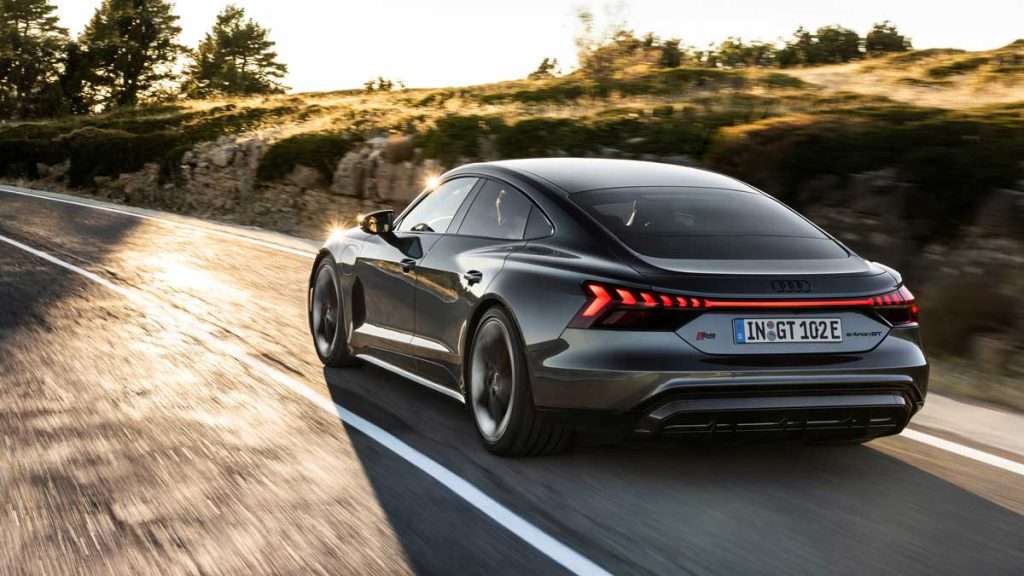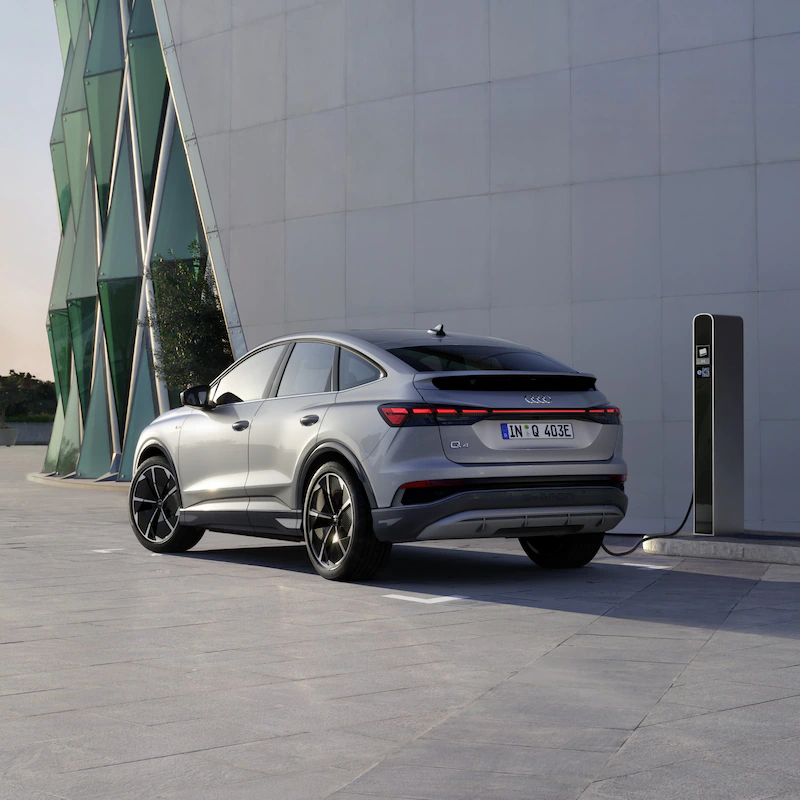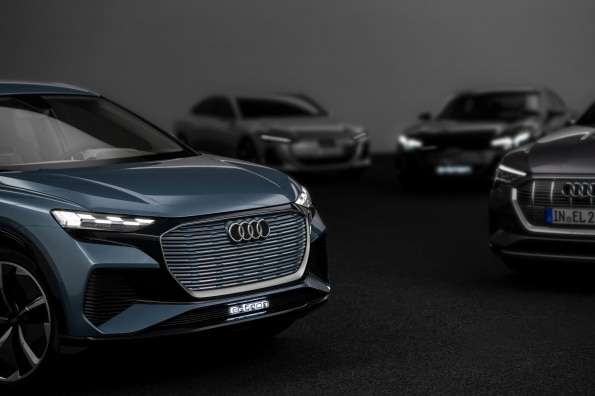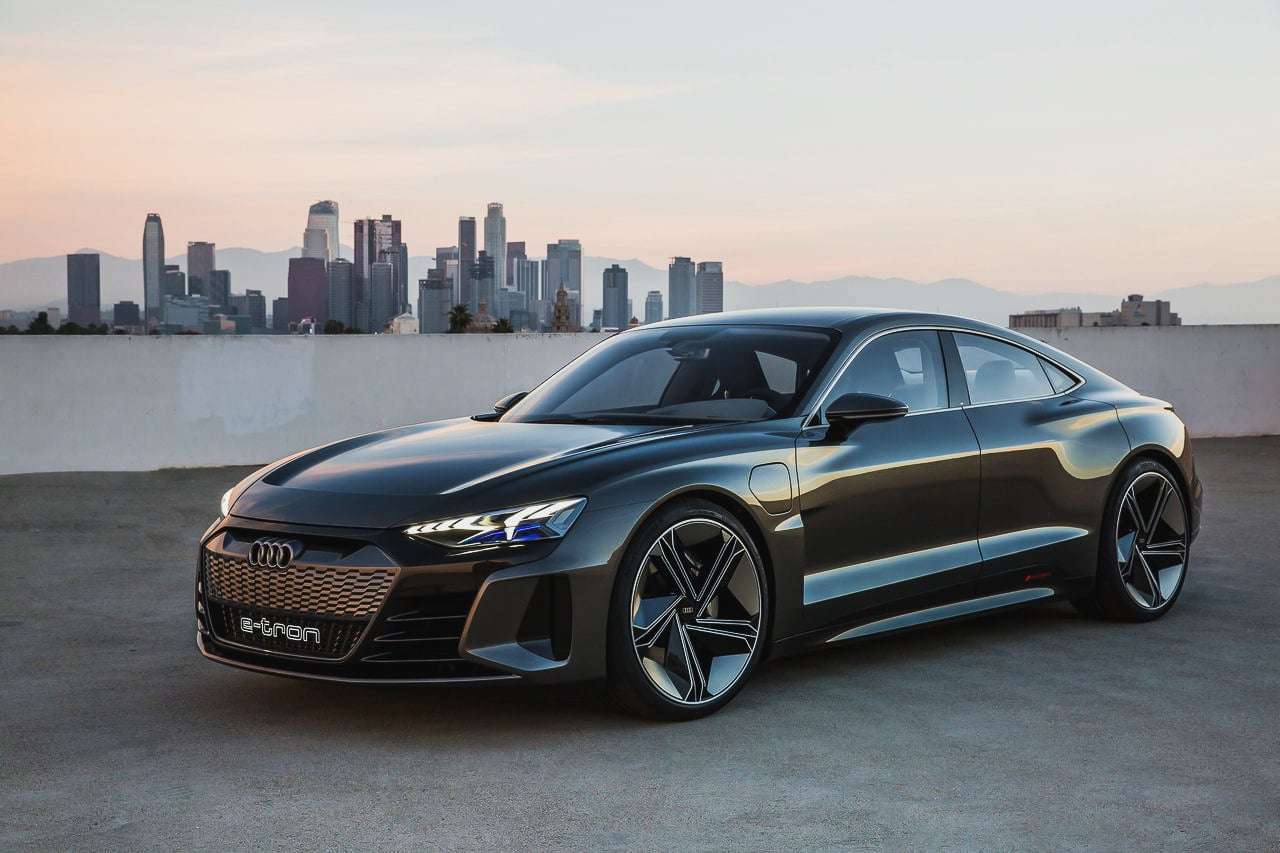As Audi recorded its biggest year yet for EVs in 2021, the luxury carmaker embraces global expansion with new electric cars and a novel approach to charging stations.
Sales of Audi’s e-tron, its family of battery-electric and plug-in hybrids, dwarfed sales increases of its other cars by a wide margin last year. While the German automaker saw sales of its SUVs including the Q2, Q5, and Q7 increase 17 percent, e-tron sales increased by 52 percent, making up 5.5 percent of all Audi sales in 2021. The company says it expects its EV sales to increase significantly in 2022, and over the next few years, its electric models will triple to more than 20. In Q4 alone, Audi reported an 86 percent increase in e-tron sales.

Audi is moving toward a fully electric line of automobiles by 2033—a target that’s later than some other luxury carmakers including Mercedes-Benz and Bentley. But that’s only if consumers are still buying combustion engines, it says. Its aim is to only release electric models starting in 2026—a target that’s earlier than most of its competition. It’s putting $20 billion toward electrification and hybridization between 2022 and 2026.
“We don’t plan to launch any [internal combustion engine] vehicles after 2026 anymore. And that means by 2033, we will be fully electric,” Audi of America President Daniel Weissland, told Yahoo Finance Live earlier this year.
Audi, a Volkswagen subsidiary, says it expects to have the largest “fully electric portfolio” of all U.S. carmakers. This includes the launch of the Q3 and the Q4 Sportback e-tron. It expects electric cars to surpass internal combustion engines after 2025.
“So we really want to lead the way towards transformation, towards electric vehicles. And that’s what I’m looking forward to,” Weissland said. “Customers want it, we see the demand in the market, and that’s what Audi will stand for in the future.”
EV charging stations
Globally, the brand is working to increase its EV presence as well. In South Africa, it recently partnered with GridCars in a move to install 70 ultra-fast charging stations across 33 sites throughout the country.
Audi is the first EV car brand to invest in this technology —150kW chargers that can charge a 95kWh battery from 10 percent to 90 percent in 30 minutes—through publicly accessible sites. The stations mark a first for South Africa.
“The investment and partnership with GridCars demonstrates our brand philosophy that the ‘future is an attitude’”, Sascha Sauer, Managing Director of Audi South Africa said in a statement.

“As we prepare for the arrival of our e-tron range, we understand that there is more to be done as an automotive brand than simply providing the product, we also have to enable and partner with those who can empower the transition to an electric future with ease and understanding. Our public chargers are new, and incremental to the current EV charging network in South Africa,” Sauer says.
Last year the German automaker launched a luxury charging hub in Nuremberg, part of a pilot program for EV owners without charging capabilities at home, such as apartment residents. There’s an amenities-rich lounge for drivers while their cars charge, but they won’t need it for very long. Audi’s test hub requires reservations for its six stations—powerful ports with 320 KW of charging power, which equates to 62 miles of driving range in just 5 minutes, the company says. It can charge a battery from 5 percent to 80 percent in just over 20 minutes.
“We want to use it to test flexible and premium-oriented quick-charging infrastructure in urban space,” Ralph Hollmig, the manager of the project, said in a statement. “We’re going where our customers don’t necessarily wake up in the morning with a fully charged electric car and at the same time thinking about increasing charging demand in the future.”
The road electric
India is also figuring prominently in Audi’s growth. The company reported sales doubled in India last year. It introduced five EVs into the market last year.
“We are very happy with our performance in 2021 despite hitting roadblocks posed by the unfortunate second wave of the pandemic and other global issues like semi-conductor, commodity prices, shipment challenges, Balbir Singh Dhillon, Head of Audi India, said in a statement. He says sales have more than doubled compared to 2020.
Part of the brand’s success is because the Volkswagen family, with the exception of Porsche, are all using the MQB platform—the $8 billion strategy for shared modular design construction for its transverse, front-engine, front-wheel-drive layout automobiles. Volkswagen is using it across global markets from India, Latin America, and China, to the U.S. and Europe.

“The world is changing,” Herbert Diess CEO of Volkswagen Group told Decoder. “[I]t is transforming into an electric automotive world where you will have less differentiation when it comes to engines. You still will have differentiation, performance-wise. You will have a rear-wheel drive, front-wheel drive, and all-wheel drive. You will have different sizes of batteries, but when it comes to the converters for the electric units or such, you get much more similarity than we have today in the industry.
“This is why we think hardware differentiation will probably be decreased in the future. It’s what we also see from the competition: we all share a similar battery. Now, this is a floor bottom battery that can fit in a huge range of cars; this is common. You have rear-wheel and front-wheel electric drives that are very similar in their design. We have a certain differentiation currently between 800-volt and 400-volt technology. We have Porsche and Audi are running on 800-volt. Volkswagen and the volume brand are on the 400-volt batteries, but we see a conversion even there,” he said.
For Weissland, Audi’s EVs are not just an answer to the climate crisis and making cars more efficient—they’re also more aligned with other conveniences of modernity, too.
“I love the fact I don’t need to see a gas station anymore,” he said. “I charge at home, like I do with my mobile phone. I plug it in at night, unplug it in the morning, and here I go—and the acceleration, and I know that I’m doing something good for the environment—saving our planet, the future of our children and grandchildren.”


